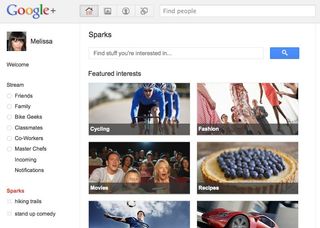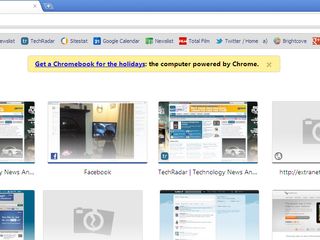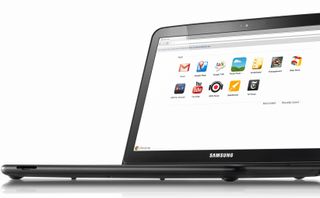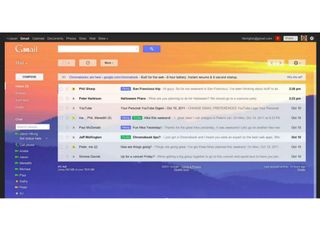Highs and lows for Google in 2011
Google's hits and misses from Android to Wallet

It's been a funny old year for Google.
While Android conquers the world, Google TV can't even conquer a branch of Comet and for every increase in market share there's a corresponding increase in regulatory scrutiny.
From social networks to mawkish movies, these are our pick of Google's 2011 highs and lows.
The Highs
1. Ice Cream Sandwich
Android has come a long way from its early incarnation as a BlackBerry-esque OS: these days it's an all-singing all-dancing Ice Cream Sandwich extravaganza. We think ICS is brilliant and can't wait for it to roll out across existing Android devices.
2. Android phones
Apple may have the mobile market's money, but Android's got the eyeballs: in November, Android accounted for a massive 52% of the smartphone market. That's some 60 million smartphones compared to 17 million iOS ones.
Get daily insight, inspiration and deals in your inbox
Get the hottest deals available in your inbox plus news, reviews, opinion, analysis and more from the TechRadar team.
3. Google+
The launch of the Google+ social networking service was a triumph, reaching an incredible 25 million users in a matter of weeks. Facebook took three years to reach the same figure.

4. Market share
Despite Microsoft's best efforts, Google's market share continues to rise: ZenithOptimedia reports that Google's global share of the search market has risen from 72% in 2006 to 85% today.
5. Google Maps
The latest Google Maps for Android introduces a feature that makes us feel we're living in the future: maps of indoor spaces such as airports and shopping malls that even know what floor you're on. It's a little stroke of genius and very Google.
6. Google Music
Google Music has been warmly received and delivers an Android equivalent to Apple's all-conquering iTunes Store. It works really well on Android tablets.
7. Bletchley Park
Google's helping to fund the restoration of Bletchley Park, the World War II base of computing hero Alan Turing. Google head of communications Peter Barron says, Bletchley Park's code-breaking work "was probably the most inspiring and uplifting achievement in scientific technology over the last hundred years."
8. Chrome
Google's browser is more popular than Firefox, with 25.69% of the global browser market. That represents extraordinary growth: in November 2009 Chrome had market share of just 4.66%.

9. Ad spots
In 2011, Google spent more money on sales and marketing than ever before: according to Kantar Media, Google spent four times more on TV ads in the first half of 2011 than it did in all of 2010. Ads such as "Dear Sophie" are designed to make us think of Google as our big pal rather than Big Brother, and they're working: according to Ace Metrix, Dear Sophie was particularly popular among women "who rated it extremely highly for likeability, attention, change and relevance".
10. Ad sales
Google's business is advertising, and that business is good: the firm's share of the global advertising market has increased from 34.9% in 2006 to 44.1% today.
The lows
1. Google Wallet blocks
Google Wallet is Google's play for the lucrative mobile payments market, and integrates both NFC-based contactless payments and online checkouts (formerly Google Checkout). However, US phone network Verizon has dealt it a major blow before it's even off the starting blocks: it won't allow the Google Wallet app on Samsung Galaxy Nexus phones until Google proves it provides "the best security and user experience". In entirely unrelated news, networks including Verizon are working on a mobile payments system.
2. Google TV
Google TV partner Logitech took an $100 million bath when nobody bought its Revue set-top box, and while Google is committed to the project it's been a dud so far.
3. ChromeOS
Remember ChromeOS and Chromebooks? You can probably forget about them again: DigiTimes reports that combined sales to date are barely 30,000 units, which is tech-speak for DOOOOOOOOOMED!

4. Google+
We're putting this in the downer category because while the initial numbers were impressive, the amount of time people actually spent using the service plummeted within weeks of the launch. As the LA Times notes, "Google+ has been fighting declines for most of its nearly five-month history". Google is connecting pretty much everything to the service to boost traffic, but so far Mark Zuckerberg isn't weeping.
5. Google Labs, Wave, Buzz and Health
Dead, dead, dead and dead respectively. Since Larry Page took over as CEO, there's been a bonfire of underperforming projects. What on earth will we do without Google Knol?
6. Booksellers
Amazon and Barnes & Noble have taken Android, fiddled with it and released their own versions on their own tablets with their own app stores - and many pundits predict they'll account for the lion's share of low-end Android tablet sales. That's bad news for Google, because those devices don't come with Google's apps or payment system. Google's effectively done the development work without getting anything in return.
7. Android patents
Incredibly, Microsoft makes more money from Android than it does from Windows Phone. The reason? Patents, which enable Microsoft to charge Android manufacturers royalties. Google's patent lawyer for one isn't too happy about that, and claims that patent suits are "being used to hinder innovation".
8. The redesign
Google's spent a lot of time this year redesigning its various services, and we think the results are mixed: Reader looks worse, and search now suffers from minor niggles such as blanking your search field when you click from Web to News. Even Google doesn't seem convinced by its new look: after introducing a black bar across the top of the screen, Google announced that it was going to get rid of it again.

9. SOPA and India
Google - and other internet firms - faces increasing pressure to censor content. The US Stop Online Piracy Act would force Google to delist sites accused of copyright infringement, while in India the Communications and Information Technology Minister Kapil Sibal has urged firms including Google to block offensive material and content that might offend some Indians' religious sensibilities.
10. The EU
The EU is gearing up for a major anti-trust investigation of Google amid allegations that the firm's algorithms unfairly penalises rival companies. A similar investigation by the EU of Microsoft took more than a decade and cost Microsoft hundreds of millions of pounds.
Writer, broadcaster, musician and kitchen gadget obsessive Carrie Marshall (Twitter) has been writing about tech since 1998, contributing sage advice and odd opinions to all kinds of magazines and websites as well as writing more than a dozen books. Her memoir, Carrie Kills A Man, is on sale now. She is the singer in Glaswegian rock band HAVR.

